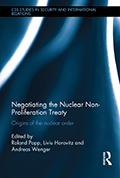Negotiating the Nuclear Non-Proliferation Treaty

Origins of the Nuclear Order
Author(s): Roland Popp, Andreas Wenger, Andreas Lutsch, Elmar Hellendoorn, Leopoldo Nuti, Laurien Crump-Gabreëls, Christine M. Leah, A. Vinod Kumar, Fintan Hoey, Jonathan Hunt, Jacob Darwin Hamblin, Liviu Horovitz
Editor(s): Roland Popp, Liviu Horovitz, Andreas Wenger
Series: CSS Studies in Security and International Relations
Publisher(s): Routledge
Publication Year: 2016
Publication Place: London
